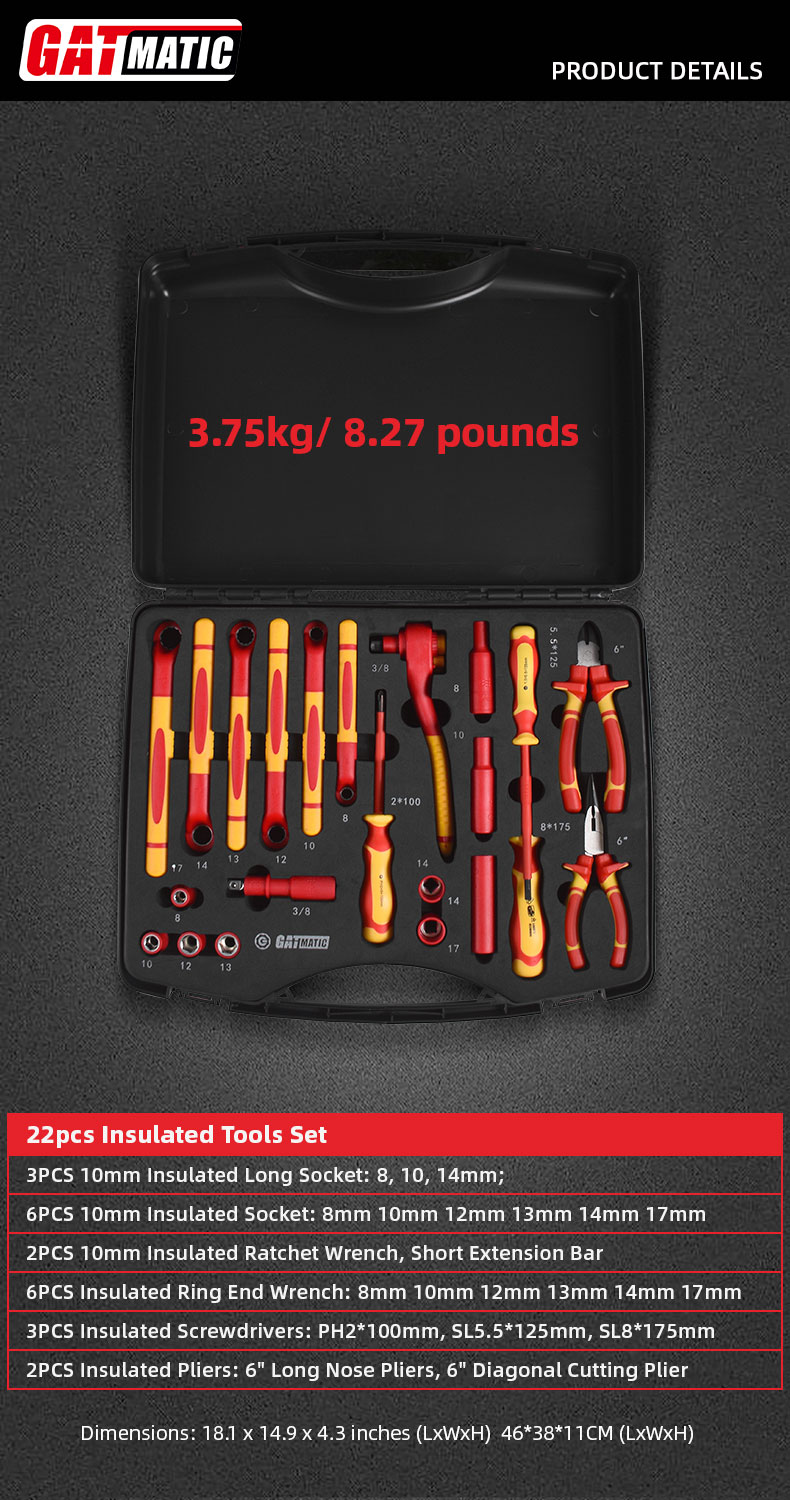Why is VDE certification important for insulated tools?
VDE certification is a hallmark of safety and quality in the field of electrical engineering, representing stringent standards set by the Verband der Elektrotechnik (VDE). This certification is crucial for insulated tools used by electricians and other professionals in the industry, ensuring they meet the highest safety and performance standards. Insulated tools are designed to protect users from electrical hazards, making the reliability and certification of these tools a matter of utmost importance.
I. Overview of VDE Certification
The VDE association has a rich history dating back to its establishment, aimed at developing and enforcing safety standards in electrical engineering. The VDE certification process involves comprehensive testing and evaluation of tools to ensure they meet strict criteria. This process includes rigorous testing procedures, where tools are subjected to mechanical, thermal, and electrical performance tests to ensure they meet the required standards. Certification is not a one-time process; it involves regular maintenance and renewal to ensure continuous compliance.
II. Safety Assurance
The primary reason for VDE certification is to provide protection against electrical hazards. Insulated tools with VDE certification are designed to prevent electric shock by adhering to stringent insulation standards. This certification ensures that the tools comply with international safety standards, such as those set by the International Electrotechnical Commission (IEC) and Underwriters Laboratories (UL). The global acceptance of VDE certification underscores its importance in ensuring safety in electrical work.
III. Quality and Reliability
VDE certification guarantees the quality and reliability of insulated tools. The rigorous testing procedures tools undergo before certification include mechanical durability tests to ensure they can withstand physical stress, thermal resistance tests to ensure they can endure high temperatures, and electrical performance tests to verify their functionality in electrical environments. This thorough testing process ensures that VDE-certified tools offer longevity, durability, and consistent quality, making them reliable for professional use.
IV. Legal and Regulatory Compliance
VDE certification also plays a critical role in legal and regulatory compliance. In many countries, using VDE-certified tools is a legal requirement, ensuring that electrical work is performed safely and to the highest standards. For instance, regions with strict regulations often mandate the use of VDE-certified tools to minimize the risk of electrical accidents. Additionally, VDE certification can influence manufacturer liability and insurance policies, as tools meeting these standards are considered safer and more reliable.
V. Market Competitiveness
In the competitive market of electrical tools, VDE certification provides a significant advantage. Consumers trust and value VDE-certified tools, often preferring them over non-certified alternatives. This trust translates into a competitive advantage for manufacturers, as VDE certification serves as a differentiator in the market. The perceived value of VDE-certified tools influences purchasing decisions, making them a preferred choice for professionals who prioritize safety and quality.
VI. Case Studies and Real-World Applications
Real-world applications of VDE-certified tools highlight their importance. For example, electricians and technicians rely on these tools for everyday tasks, ensuring their safety while working with electrical systems. Industrial applications also demonstrate the critical role of VDE-certified tools in maintaining safety standards. Incident reports and case studies often highlight how VDE-certified tools have prevented accidents, reinforcing their value. Statistical data on safety improvements further underscore the positive impact of using VDE-certified tools in reducing electrical hazards.
Conclusion
In summary, VDE certification is essential for insulated tools, providing assurance of safety, quality, and reliability. This certification ensures that tools meet stringent safety standards, protecting users from electrical hazards and enhancing their performance. VDE certification also plays a crucial role in legal compliance and market competitiveness, making it a key consideration for manufacturers and consumers alike. As the industry continues to evolve, the importance of adhering to VDE certification standards will remain critical in ensuring safety and quality in electrical engineering.
Get Access Now: https://www.gat-matic.com/
FAQs
1. What is VDE certification?
VDE certification is a mark of quality and safety issued by the Verband der Elektrotechnik (VDE), a German association responsible for setting standards in electrical engineering. This certification ensures that products, including insulated tools, meet rigorous safety, performance, and quality standards.
2. Why is VDE certification important for insulated tools?
VDE certification is crucial for insulated tools because it guarantees they meet high safety standards, protecting users from electrical hazards such as electric shock. It ensures that the tools have been tested and proven to perform reliably under specified conditions, thereby enhancing safety and reliability in electrical work.
3. What types of tests do insulated tools undergo for VDE certification?
Insulated tools undergo a variety of tests for VDE certification, including:
- Mechanical durability tests: To ensure the tools can withstand physical stress.
- Thermal resistance tests: To verify that the tools can endure high temperatures.
- Electrical performance tests: To check the tools’ functionality and safety in electrical environments.
4. How does VDE certification compare to other certifications like IEC or UL?
VDE certification is comparable to other international certifications such as IEC (International Electrotechnical Commission) and UL (Underwriters Laboratories). All these certifications ensure safety and quality, but VDE is particularly well-regarded in Europe. VDE-certified tools meet strict European standards and are globally recognized, often required by law in various regions.
5. Is VDE certification legally required for insulated tools?
In many countries, VDE certification is a legal requirement for insulated tools used in professional electrical work. This legal mandate ensures that tools meet stringent safety standards, minimizing the risk of electrical accidents and ensuring compliance with national and international regulations.
6. What impact does VDE certification have on manufacturers?
For manufacturers, VDE certification provides a competitive advantage by signaling high quality and safety standards to consumers. It also reduces liability and can influence insurance policies favorably, as certified tools are considered safer and more reliable.
Describe Your Needs In Detail!
We will carefully evaluate your needs and give professional solutions.



